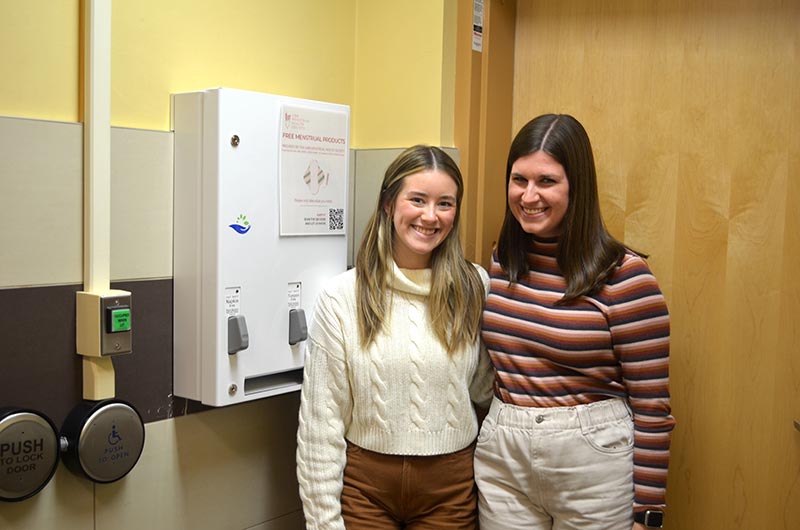The UNB Menstrual Health Society is reducing period poverty
Author: UNB Newsroom
Posted on Oct 19, 2022
Category: UNB Fredericton

The Menstrual Health Society at the University of New Brunswick (UNB) is working to build a safe, inclusive educational environment on UNB’s Fredericton campus and beyond.
Established in January 2022, the UNB Menstrual Health Society is a volunteer-driven organization co-founded by students Caroline Stephen and Kate Palmer. The Menstrual Health Society is working to reduce the stigma around menstrual health while supplying better access to menstrual products and educational programs on menstrual hygiene.
“Approximately one in seven of the menstruating population in Canada have reported missing school due to the inaccessibility of menstrual products,” said Stephen, a sixth-year engineering student. “By working with partners such as the UNB Student Union, Union of Graduate Student Workers, UNB Alumni, Association of University of New Brunswick Teachers, UNB Capital Planning and Operations and the Office of the Vice President Academic (Fredericton), we have been able to increase accessibility.”
The pilot project has led to the installation of 15 free menstrual product dispensers across campus. These dispensers supply free tampons and sanitary pads to the menstruating population on the Fredericton campus, which is approximately 54 per cent of the student body. The dispensers are filled two to three times per week by volunteers. Approximately 2,000 menstrual products have been supplied through the dispensers since August.
One of the society's goals is to raise awareness about the environmental impacts of disposable menstrual products.
“We want to increase the accessibility of sustainable menstrual product options on campus to align with the UNB Campus Sustainability Plan,” said Palmer, third-year bachelor of science in psychology student. “We are seeking funding to pursue a partnership with a Canadian company that supplies a wide range of sustainable menstrual product options, including period underwear, menstrual cups and reusable pads.”
“There are many barriers students face in accessing sustainable menstrual products,” she added. “Although the long-term expense of reusable products is significantly lower, the upfront costs can be a financial barrier for many. By supplying products to students and community members, we can alleviate the financial burden and create a greater understanding of the significance of sustainable menstrual health.”
In addition to the dispenser and sustainability projects, other UNB Menstrual Health Society initiatives include high school and middle school outreach and working to set up partnerships with various local organizations such as Fredericton shelters, health clinics and fitness centers.
Stephen and Palmer reflected on how being a student at UNB provided them with the perfect environment to manage a large project like the UNB Menstrual Health Society.
“We had the support of the UNB community right from the beginning, and it was just a matter of learning to navigate and find the proper channels for funding,” said Stephen. “Whether through in-classroom work or extra-curricular activities, our experience at UNB has allowed us to learn to work with a huge team and collaborate on projects. All in all, it has really prepared us for life beyond our degree.”
"This really is a good way to show how an idea can come into action in order to benefit the community,” added Palmer. “By working with our partners at UNB, we were able to make our vision become a reality. We look forward to the future of the UNB Menstrual Health Society and the next steps we can take to reduce the stigma and provide a safe, inclusive space for all.”
For more information on how you can financially support the UNB Menstrual Health Society and to be informed on all upcoming activities and dispenser locations, follow us on YouTube, Facebook, Instagram and Tik Tok. Volunteer positions are available to UNB students, faculty, staff and members of the greater community.
Free menstrual products are also available at the Student Union Building in both the University Women’s Centre (UWC) and The 203 Centre for Gender and Sexual Diversity. The 203 Centre also carries free sustainable options.
Media contact: Angie Deveau
